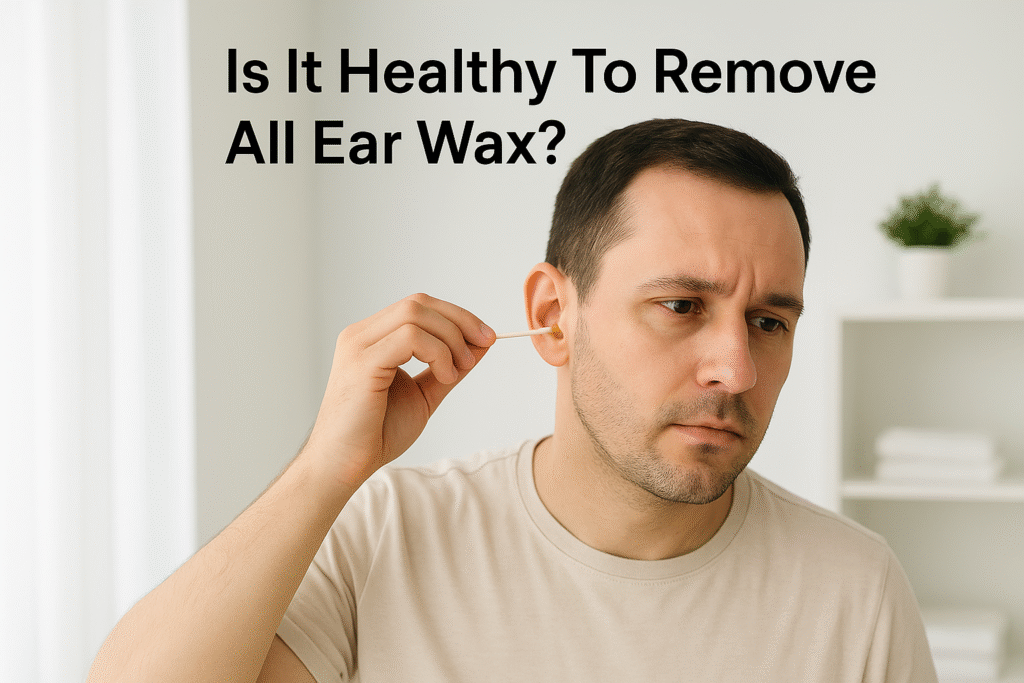No, you don’t want to get rid of all earwax. Conveyed by our hearing system, earwax actually protects and lubricates the ear canal by capturing dust and bacteria. Earwax protects against infection. Unrecoverable removal can interrupt these activities, result in dryness and irritation, or increase the isk of infection. The ear is usually self-cleaning, and new wax should not be removed unless it’s causing issues like hearing loss, pain, or fullness in the ears, ideally by a health care provider.
The Benefits of Earwax
Earwax serves as the ear’s first line of defense. Its primary functions include:
- Protection Against Bacteria: Earwax traps airborne particles such as dust, dirt, and microorganisms to prevent them from entering your ear canal. It is also antibacterial to avoid infection.
- Lubrication of Ear Canal: The oil in earwax not only helps moisturize the lining of the ear canal, thus preventing dry, itchy ears, but also maintains the natural acidic environment within the ear and assists in keeping harmful bacteria and fungus away from entering and causing damage to this sensitive part of your body.
- Maintain healthy ears: Earwax protects your ear canal by forming a protective barrier that reduces the risk of middle-ear infection or other damage caused by foreign bodies.
Hearing problems may result if instruments and ear wax removal in Las Vegas are removed by methods that can disturb the skin of the acoustic meatus and eardrum. When residual wax is no longer present, these benefits will be lost.
Why It’s Not a Good Idea to Clear Out All of Your Earwax
And although you may want to clear out that excess wax, overdoing it can lead to a host of issues:
- Ear Canal Damage: If you insert cotton tip applicators or hairpins, the ear canal can get irritated. It may be uncomfortable and can bleed at times.
- Impacted Earwax: Rough cleaning can make wax go deeper and even block the ear instead of removing it. ALSO READ: Earwax blockage can lead to muffled hearing, pain or sense of fullness in your ear
- Higher Risk of Infection: When all earwax is removed, a natural protection for the ears is taken away. This can also lead to bacteria or fungus growing in your ears.
- Eardrum Damage: It is possible to break an eardrum when falling down or getting an ear infection, cleaning of the ears can also damage it, you may end up losing your hearing or any other unpleasant thing.
The ear is largely self-cleaning, according to experts with Harvard Health. Normal jaw movements — as when chewing or talking, for example — help nudge earwax out naturally. Most people don’t need to have it removed unless it’s symptomatic.
When Earwax Removal Is Necessary
While it is not recommended to clear all the earwax every day, sometimes you will need intervention. Implications of too much earwax Some consequences of having so much earwax could include:
- Hearing loss or muffled hearing
- Ear pain or discomfort
- Tinnitus (ringing in the ears)
- Fort Fullhet eller stilla tryck i öronen
- Recurrent ear infections
If the answer is yes, then the best and safest way to clear your ears is by a healthcare provider. In general, irrigation followed by a gentle pour extraction or manual removal with instruments is the preferred method of wax removal, although wax-dissolving agents may also be used. These methods minimize the risk of injury to the ear canal or eardrum, which often occurs with do-it-yourself efforts such as cotton swabs or other objects.
Safe Practices for Ear Care
Here are some simple and safe ears cleaning tips to keep your dog’s ears looking good, not hurting him.
- Don’t put things in your ear. These family tools can be cotton swabs,hairpins, and so on.
- Use ear drops to loosen wax as directed by a healthcare professional (if these do not contraindicate).
- Talk to a professional if you have hearing loss, ear pain then talk to a professional.
- Never attempt ear candling—it does not work and it can be dangerous.
Conclusion
Earwax Removal is an important part of the ear’s self-cleaning mechanism. It doesn’t usually need to be removed completely and may cause injury. And while it’s great to be attentive to your aural health, taking good care of those ears means knowing when there actually is a problem, and what the next steps are in addressing it safely and professionally. By being in the good graces of earwax and resisting efforts to over-clean it, you can preserve your ears’ health and keep infection at bay for well-rounded hearing.
This more measured approach does a lot to reinforce a healthy, balanced perspective on ear care that often gets ignored by the plethora of online medical sources (many write-ups do lean slightly toward tips for removal and only lightly reference problems with constantly cleaning your ears), but also tends away from explorations into how beneficial earwax can be. To schedule your appointment with the highest standard of care, visit Sahara West Urgent Care on our website, where you can also explore more informative blogs



